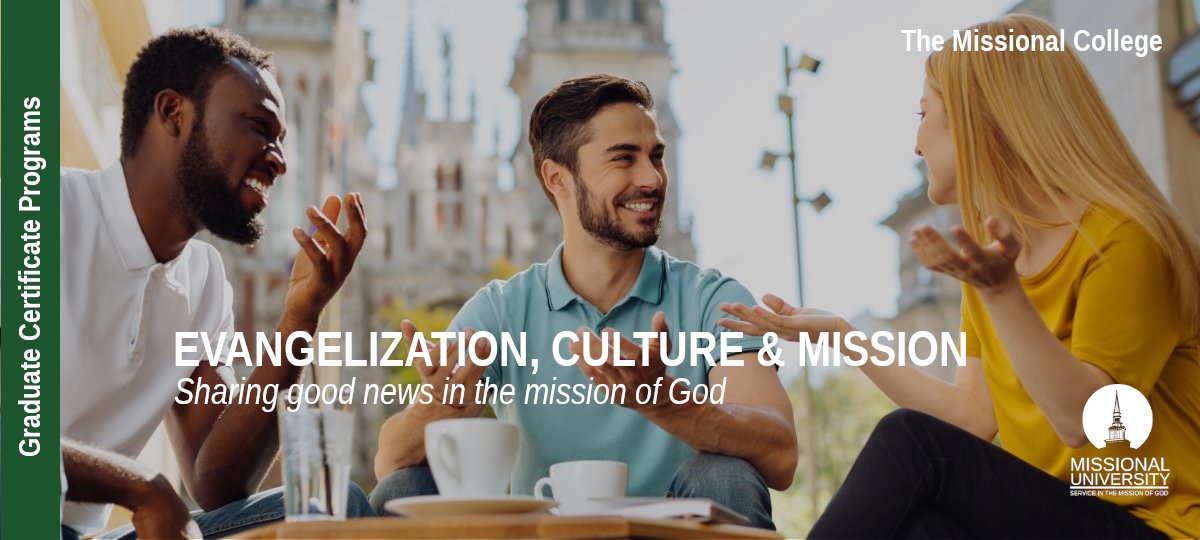
Online Graduate Certificate in
Evangelization, Culture, & Mission
School: Missional College // Study Area: Serving Spiritual Needs
☀ Totally Unique Program = only available at Missional University
Expand Your Intercultural Abilities Today!
REQUEST INFORMATION
Ready to learn more about the
Graduate Certificate in
Evangelization, Culture, & Mission?
LEARN MORE NOW
Program Features
-
Integrated practicums allow you to gain valuable real-world experience
-
Learn from academic practitioners from around the world
-
Credits earned in this certificate program can apply to a Missional University Master's degree program
Course Effort
Course Length
Credits Required
Program Cost
What Will I Study?
We offer the most comprehensive approach to sharing the good news across cultural barriers.
A sociocultural, rhetorical, and historical analysis of the proclamation and witness of Jesus and the Apostles and its implication for message development in varous cultural contexts. Students will analyze the structure and delivery of biblical proclamation in terms of its audience and intent in order to discern ways culture and context contribute to the formation of theological approaches to missional proclamation. Students will craft contemporary messages and approaches using New Testament models of proclamation and witness designed for an unreached or underserved group of people of their choosing.
An examination of biiblical and extra biblical evidence of the relationship between modalities (communities of faith) and sodalities (missional teams) and ways in which that relationship has been interpreted. Writings from biblical scholars, theologians, missiologists and practitioners are evaluated to determine their conceptions of New Testament mission, how that relationship is defined, and implications for understanding practical implemention of the missio dei in contemporary cultures.
An evaluation of the principles that comprise effective missional engagement with individuals, groups, and communities. The course explores theories, strategies and methods that undergird missional enagement. Students construct a missional engagement framework utilizing theories, strategies and methods that undergird missional engagement. They also construct a missional scorecard in order to measure biblical success on the basis of the missio dei, the functional role of the congregation, and the multiplication of disciples, disciplemakers, and servant leaders among all groups of people within a specific sociocultural setting.
An introduction to the study of the role of religion in personal and large-scale social networks. Applies social network analysis insights to faith development and spirituality. Emphasis is placed upon analytical tools such as centrality; cliques; range and reciprocity; frequency and duration; relational networks such as friendship, kin, associations; and sub-cultural networks such as lifestyles, occupational, organizational, and ethnic. Students learn how network relationships impact friendship, intimacy and involvement in the community, lifestyle, and faith transmission by applying the analytical tools to the nexus of social networks and faith diffusion and development.
Building on a theological understanding of the relationship between the gospel and culture, this course investigates the ways in which cultural differences impact the missional leader, the gospel message, and the missional community from an anthropological lens. Students create a framework for evaluating incarnational mission, cultural assumptions, critical contextualization, and inculturation in light of anthropological theories such as diffusionism, functionalism, structuralism, cultural materialism, and symbolic anthropology.
For effective and meaningful Christian witness to take place in the missional context of many languages and cultures, people need to have a deepening understanding of good communication principles. Communication Theory for Christian Witness builds upon the study of human communication with special attention to issues in linguistics, contextualization, storying and the use of new developments in fields of technology.
Knowing your people is essential to the process of developing missional ministry. In this class you will develop a full ethnography incorporating both worldview and anthropological insights for the purpose of launching mission amongst unreached and least reached people groups.
When Can I Get Started?
We offer multiple start dates each year to give you flexibility in your education, life and work schedules.
JANUARY
MARCH
MAY
AUGUST
OCTOBER
A Career in Navigating Cultural Difference
Is this Your Mission?
Compassion Evangelism, Cross-cultural Evangelist, Evangelism Trainer, Evangelist among Immigrants & Refugees, Evangelist among World Religious Groups, Literacy Evangelist, Personal Evangelist, Small Group Evangelism Coordinator
Request Information Now
How Much Will it Cost?
We offer tuition based upon country of residence. According to the Human Development Index, all countries around the world fall into one of four categories:
-
(Tier 1) - Very High Human Development
-
(Tier 2) High Human Development
-
(Tier 3) Medium Human Development
-
(Tier 4) Low Human Development
Our tiered global tuition makes higher education affordable for everyone world wide.

TIER COUNTRIES
100% Tuition
$395
per credit hour
3 credit course
$1185

TIER COUNTRIES
80% Tuition
$316
per credit hour
3 credit course
$948

TIER COUNTRIES
60% Tuition
$237
per credit hour
3 credit course
$711

TIER COUNTRIES
40% Tuition
$158
per credit hour
3 credit course
$474
Tiered tuition based on country of origin and scholarships available. Find your country of residence here for more information.
Tuition may be further reduced by participating in the Sponsorship Program.
